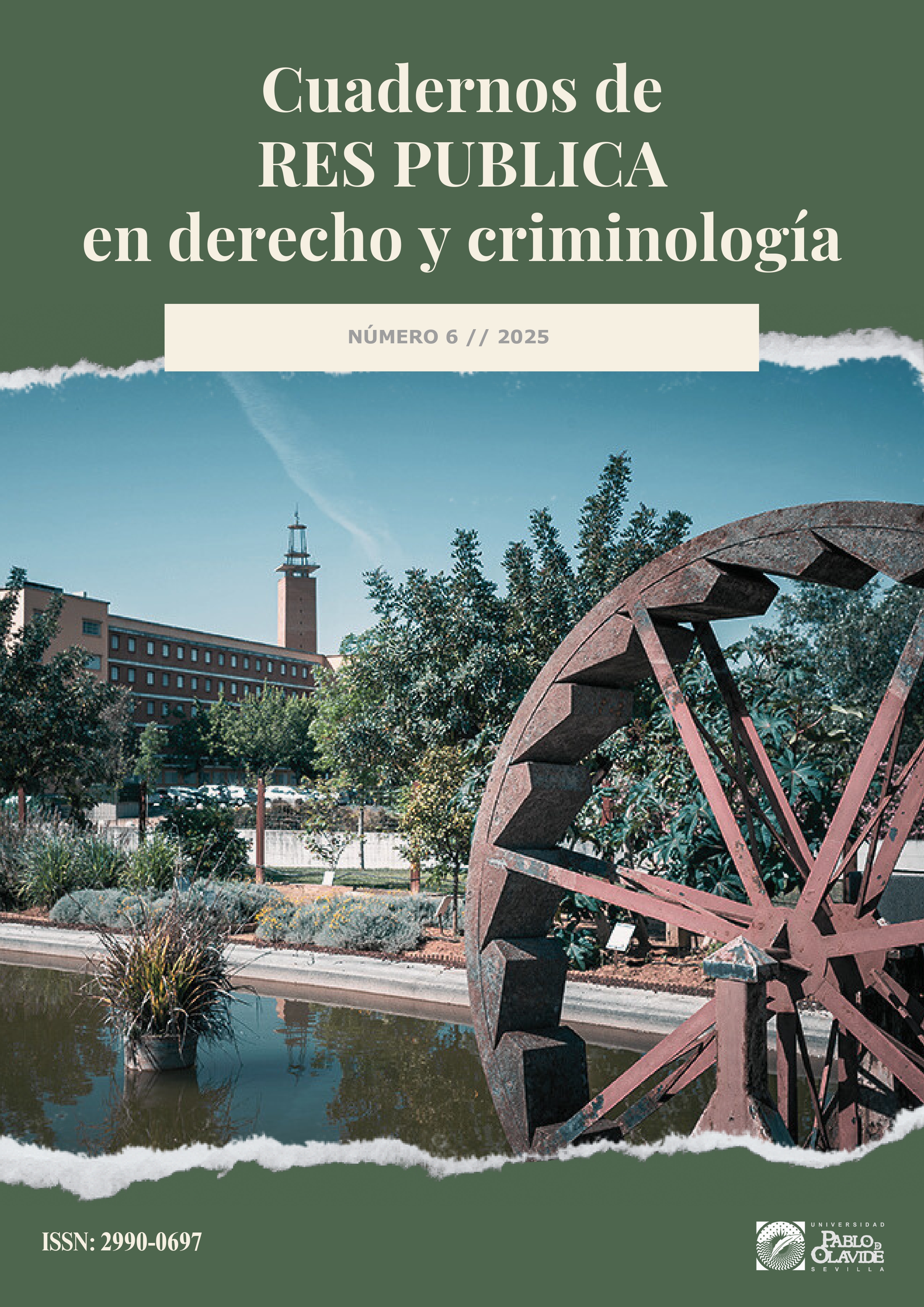The Revisable permanent prison in Spain (2015-2025)
Critical assessment of its practical application, constitutional challenges and reform prospects
DOI:
https://doi.org/10.46661/respublica.12065Keywords:
revisable permanent prison, social reintegration, comparative lawAbstract
The revisable permanent prison (PPR) was introduced into the Spanish legal system by Organic Law 1/2015, of March 30th, representing one of the most controversial criminal reforms of the last decade. Comparable to the reviewable life sentences in other European systems, its implementation responded to growing social demands for harsher penalties for extremely serious crimes, despite a decreasing trend in serious criminality. Lawmakers justified the PPR as a mechanism that, without abandoning the aim of social reintegration, seeks to guarantee the protection of society against highly dangerous individuals, establishing an indeterminate custodial sentence subject to judicial review after a minimum period of imprisonment. However, its approval sparked intense political, social, and academic debate, with critics questioning its compatibility with constitutional principles of humanity and the orientation toward reintegration. This paper provides a critical assessment of the practical application of the PPR in Spain from 2015 to 2025, examining its real impact, the constitutional challenges it has raised, and prospects for reform, in comparison with European models and in light of international human rights standards.
Downloads
References
BONIS, Evelyne., (2021). Motivation de la période de sûreté. Droit penal, nº 12.
BORJA JIMÉNEZ, Emiliano., (2016). Peligrosidad criminal e individualización judicial de la pena, en Revista de Derecho Penal y Criminología, nº 16, 45-86.
CASALS FERNÁNDEZ, Ángela., (2021). Algunos aspectos controvertidos de la pena de prisión permanente revisable, en Anuario de Derecho Penal y Ciencias Penales, nº 1, 583-606. https://doi.org/10.53054/adpcp.v74i1.7907
CERVELLÓ DONDERIS, Vicenta., (2005). La clasificación en tercer grado como instrumento resocializador, en Estudios de Derecho Judicial, CGPJ, nº 84.
DRENKHAHN, Kirstin, Morgenstern, Christine., (2012). Dabei soll es uns auf den Namen nicht ankommen-Der Streit um die Sicherheitsverwahrung. Zeitschrift für die gesamte Strafrechtswissenschaft, vol. 124, nº 1, pp. 132-203. https://doi.org/10.1515/zstw-2012-0005
FIANDACA, Giovanni-Musco., (2013). El Derecho Penal entre la ley y el juez: estudios de derecho penal, Dykinson.
FITZ-GIBBON, Kate., (2013). The mandatory life sentence for murder: An argument for judicial discretion in England. Criminology & Criminal Justice, vol. 13, nº 5, pp. 506-525. https://doi.org/10.1177/1748895812458297
FRANCO SERRANO, María Teresa., (2019). Breves aspectos sobre la constitucionalidad de la prisión permanente revisable, en Actas del VI Congreso nacional Penitenciario Legionense, Univ. de León.
GARCÍA RIVAS, Nicolás., (2017). Razones para la inconstitucionalidad de la prisión permanente revisable, en La ley penal: revista de derecho penal, procesal y penitenciario, nº. 128.
JAKOBS, Günther., (2004). Staatliche Strafe -Bedeutung und Zweck, Paderborn.
KALICA, Elton., (2019). La pena di norte viva: Ergastolo, 41 bis e diritto penale del nemico, Mimesis.
LEGANÉS GÓMEZ, Santiago. (2023). Las víctimas del delito en la ejecución penitenciaria. Cuadernos de RES PUBLICA en derecho y criminología, n.º 1 (mayo):25-40. https://doi.org/10.46661/respublica.8041.
MATA Y MARTÍN, Ricardo M. (Dir), MONTERO HERNANZ, Tomás (Coor.)., (2021). Salud mental y privación de libertad. Aspectos jurídicos e intervención, Bosch Editor. https://doi.org/10.2307/j.ctv1tqcxk4
PASCUAL MATELLÁN, Laura., (2015). La prisión permanente revisable. Un acercamiento a un derecho penal deshumanizado, en Clivatge. Estudis i testimonis sobre el conflicte i el canvi socials, nº 3, pp. 51-65.
RÍOS MARTÍN, Julián., (2013). La prisión perpetua en España. Razones de su ilegitimidad ética y de su inconstitucionalidad, Tercera prensa-hirugarren prensa.
RODRÍGUEZ YAGÜE, Cristina., (2019). Seis frentes abiertos de la prisión permanente revisable, en Diario La ley, nº 9479, Sección tribuna.
ROXIN, Claus., (2007). La teoría del delito en la discusión actual, Grijley.
SILVA SÁNCHEZ, Jesús María., (2023). Cuidado con las alternativas, InDret, nº 4, 1-28.
TAMARIT SUMALLA, Josep María., (2015). La prisión permanente revisable, en QUINTERO OLIVARES, Gonzalo (Dir.). Comentario a la reforma penal de 2015, Thomson Reuters Aranzadi.
VARONA GÓMEZ, Daniel., (2013). "Percepción y elección del castigo en España: resultados a partir de la encuesta social europea", en Cuadernos de Política Criminal, nº 111.
VEGAS AGUILAR, Juan Carlos., (2023). Los trabajos en beneficio de la comunidad como ejemplo de medida restaurativa. Editorial Tirant Lo Blanch.
WELZEL, Hans., (2010). Das Deutsche Strafrecht: Eine systematische Darstellung, De Gruyter Lehrbuch.
Downloads
Published
How to Cite
Issue
Section
License
Copyright (c) 2025 Mar Aranda Jurado

This work is licensed under a Creative Commons Attribution-NonCommercial 4.0 International License.




